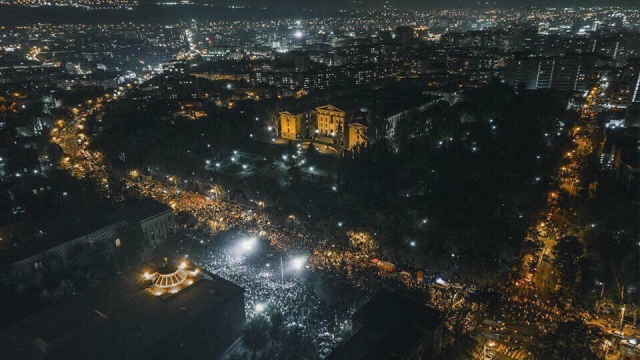New Political Crisis in Armenia as the Government of National Unity Collapses
OPINION
News of the death of international renowned musical icon Charles Aznavour was a shock for most people in Armenia. Prime Minister Pashinyan even announced a national day of mourning. Armenians were glued the news, waiting to see if their national icon would be interred in France, where he was born and spent most of his life, or in Armenia where he had his ethnic roots. After it was announced that, in accordance with Aznavour’s will, he would be buried in Paris next to his parents, Pashinyan announced that he would go to Paris for the funeral.
Under conditions of despair and mourning in Armenia, the Republican faction of parliament, which still holds the majority of seats although the party lost the controlling vote in parliament after the Velvet Revolution in May, introduced a new draft law. The proposed law would create more obstacles to calling snap elections, which is one of the main points on Pashinyan’s agenda, and the revolutionary movement he leads.
News of the Republican Party’s sudden plan was announced by Pashinyan, who, during a live video session on Facebook, called the Republicans “counter-revolutionary forces” and called on his supporters to take to the streets immediately and occupy the territory surrounding the parliament building.
Minutes after Pashinyan’s call on Facebook, several thousand people gathered near the parliament building. In less than 30 minutes, late at night, they blocked all the entrances to the parliament. Minutes later, Pashinyan appeared before the crowd and spoke publicly, saying that his governmental allies such as the Tsarukian Alliance, led by billionaire Gagik Tsarukian and the Armenian Revolutionary Federation of Dashnaktsutyun have joined their forces with the Republican party to support the draft law. Pashinyan then, in the presence of his supporters, signed a decree to fire the members of his cabinet representing the Tsarukyan Alliance and Armenian Revolutionary Federation of Dashnaksutyun from their posts, which was met with calls of support from the crowd.
After signing the decree, Pashinyan announced that he will be holding new negotiations with the parliamentary factions. As the Prime Minister entered the parliament building, the gates, which are generally closed to the public, were opened on Pashinyan’s order and the demonstrators entered the garden to wait until the end of the negotiations – an extraordinary event in Yerevan.
While Pashinyan was negotiating with the parliamentary factions, the onlookers in the garden periodically began chanting revolutionary slogans and listened to the music of Charles Aznavour blaring from the large loudspeakers in the garden that had been set up for Pashinyan’s speech.
During the negotiations, a representative of the Dashnaksutyun Party released a statement on leaving the government of national unity lead by Pashinyan.
The Prime Minister finished the negotiations at 1:00 in the morning, and appeared in front of his supporters again, announcing that he had made a verbal agreement that in the coming weeks he will resign from his post, and the parliamentary factions will not nominate any candidate – if any faction does nominate a candidate, and the parliament fails to elect a new Prime Minister twice in 16 days, the parliament will be dissolved – in accordance with the Constitution.
Pashinyan announced that, according to his plan, snap parliamentary elections will be held in the beginning of December 2018, although Pashinyan’s team previously insisted that the elections should be held in April-May 2019, a year after the Velvet Revolution.
In hopes that the mourning ceremonies and the coming summit of French speakers, La Francophonie, October 7-12 in Yerevan, will prevent Pashinyan from calling his supporters to take to the streets again, the Republican party has hastened the political processes.
The intrigue of the draft law is in that it may allow the parliament to elect a new Prime Minister after Pashinyan resigns, and there are fears that Robert Kocharyan, who is now being prosecuted for overthrowing the constitutional order in 2008 and shooting peaceful demonstrators, can return to power as a new Prime Minister elected by the parliament. As the current parliamentary makeup does not represent the will of the people, this election may again escalate the political situation in the country, as during the 10 years of Kocharian’s rule he was recognized as an authoritarian leader who used violence to disperse any political demonstrations against him.
The Tsarukian Alliance and Dashnaksutyun always supported Kocharian during his presidency and may support his nomination in the parliament as Prime Minister. By electing a new leader, the parliament may avoid holding snap elections, which is in the interest of these three parties. Recent elections to Yerevan City Council showed that they received the lowest percentage of votes ever. Dashnaksutyun received less than 1% of the votes and the Prosperous Armenia Party, led by Tsarukian, received only 7%. The alliance My Step, supporting Prime Minister Pashinyan, received 81% of the votes, an the elections were recognized as the most democratic and fair in the last 20 years.
By Karen Tovmasyan












